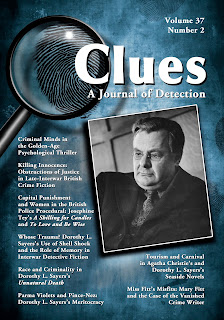Featuring History of Mystery/Detective Fiction and Other Literary Ramblings of Elizabeth Foxwell
Showing posts with label T. S. Eliot. Show all posts
Showing posts with label T. S. Eliot. Show all posts
Monday, September 02, 2019
Clues 37.2: Interwar mysteries.
The volume 37, no. 2 (2019) issue of Clues has been published, which is a theme issue on interwar mysteries guest edited by Victoria Stewart (University of Leicester, UK). See below for the abstracts. To order the issue, contact McFarland.
Ebook versions available: GooglePlay, Kindle, and Nook.
Introduction / VICTORIA STEWART. The guest editor of Clues 37.2 on interwar mysteries discusses its contents, including articles on Agatha Christie, Mary Fitt. Ngaio Marsh, Clifford Orr, Raymond Postgate, Dorothy L. Sayers, and Josephine Tey.
Detecting Histories, Detecting Genealogies: The Origins of Golden Age Detective Fiction / STACY GILLIS (University of Newcastle, UK). This article traces interwar attempts to define detective fiction, with an emphasis on how critics such as Dorothy L. Sayers, H. Douglas Thomson, and T. S. Eliot traced its origins in classical, biblical, and more recent texts. It argues that this demonstrates an anxiety relating to conceptions of literary taste on the part of these commentators.
“The Ghost of Dr. Freud Haunts Everything Today”:
Criminal Minds in the Golden-Age Psychological Thriller / STEFANO SERAFINI (Royal Holloway, University of London). This essay provides new insights into the development of interwar crime fiction by investigating how, and to what extent, two such apparently irreconcilable subgenres as the classic detective story and the psychological thriller interact and intertwine in the work of often-neglected Golden Age writers.
Killing Innocence: Obstructions of Justice in Late-Interwar British Crime Fiction / J. C. BERNTHAL (University of Cambridge). This article analyzes Agatha Christie’s And Then There Were None and Raymond Postgate’s Verdict of Twelve, both written toward the end of the interwar period and published at the outset of World War II. Christie and Postgate interrogate ethics in the British criminal justice system, using the figure of the child-victim to complicate interwar constructions of innocence.
Capital Punishment and Women in the British Police Procedural: Josephine Tey’s A Shilling for Candles and To Love and Be Wise / EVIE JEFFREY (University of Newcastle, UK). This article considers Josephine Tey’s engagement with contemporary capital punishment debates through considering the phenomenon of the “wrongful” arrest. It argues that women are central to the exploration of these debates, particularly when reading the novels as part of the subgenre of police procedurals within the Golden Age of detective fiction.
Thursday, October 02, 2014
T. S. Eliot in publishing (at age 10).
 |
| T. S. Eliot, ca. 1923 |
Perhaps things picked up for him when he joined Faber in 1925...
Thursday, September 17, 2009
T. S. Eliot, publisher.
Opening this week at the British Library is an exhibition on T. S. Eliot's work at British publisher Faber & Faber. The Guardian provides a peek at some of the featured photographs, including one with Eliot, W. H. Auden, Ted Hughes, Louis MacNeice, and Stephen Spender.
Subscribe to:
Posts (Atom)
